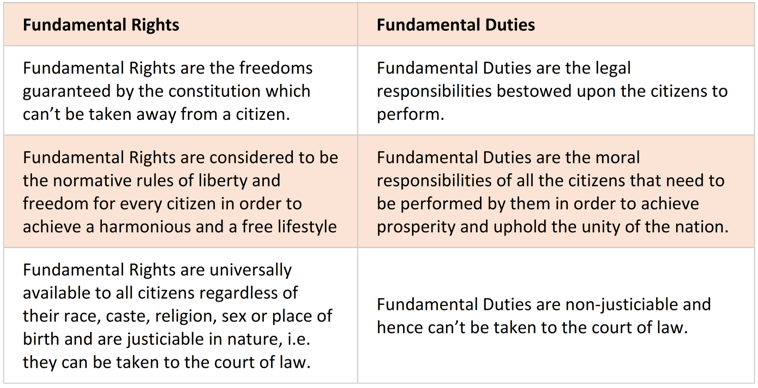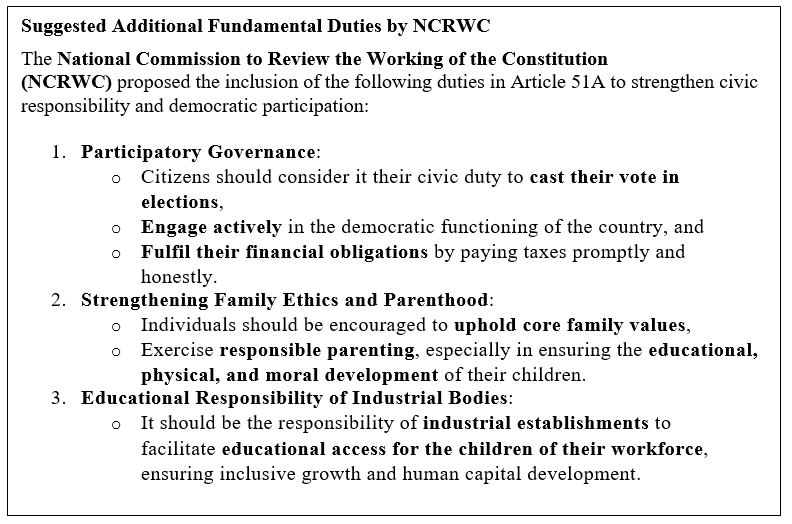Part IV-A of the Constitution of India: Fundamental Duties
- Articles Covered: Article 51A (only one article)
- Inserted by: 42nd Constitutional Amendment Act, 1976
- Inspired by: The Constitution of the former USSR (now Russia)
Background and Context
Before 1976, the Indian Constitution had no mention of Fundamental Duties. Only Fundamental Rights (Part III) and Directive Principles of State Policy (Part IV) existed.
However, during the Emergency period (1975–77), the government felt the need to remind citizens of their responsibilities to the nation. Thus, Part IV-A was added to introduce Fundamental Duties, aimed at promoting civic consciousness and nationalism.
|
Article 51A – Fundamental Duties
This article lists the duties of every Indian citizen. These are non-justiciable, meaning they cannot be enforced by the courts, but they can still be used to interpret laws and promote constitutional values.
|
Originally 10 Duties (in 1976); now 11 (after 2002)
|
Here’s the full text of Article 51A, with explanation of each clause:
“It shall be the duty of every citizen of India—”
(a) to abide by the Constitution and respect its ideals and institutions, the National Flag and the National Anthem;
Citizens must respect democratic institutions like the Parliament, Judiciary, and uphold constitutional values.
(b) to cherish and follow the noble ideals which inspired our national struggle for freedom;
Emphasizes remembering the values of truth, non-violence, freedom, and justice from the independence movement.
(c) to uphold and protect the sovereignty, unity and integrity of India;
Every citizen must act in ways that preserve the country’s territorial and political unity.
(d) to defend the country and render national service when called upon to do so;
Implies that every citizen should serve the nation, especially in times of war or emergency.
(e) to promote harmony and the spirit of common brotherhood amongst all the people of India transcending religious, linguistic and regional or sectional diversities; to renounce practices derogatory to the dignity of women;
Encourages national integration and gender equality.
(f) to value and preserve the rich heritage of our composite culture;
Citizens should protect India’s diverse traditions, languages, arts, and customs.
(g) to protect and improve the natural environment including forests, lakes, rivers and wildlife, and to have compassion for living creatures;
Reflects concern for environmental protection and animal welfare.
(h) to develop the scientific temper, humanism and the spirit of inquiry and reform;
Promotes rational thinking, scientific attitude, and progressive reforms.
(i) to safeguard public property and to abjure violence;
Encourages people to protect government property and avoid violent behavior.
(j) to strive towards excellence in all spheres of individual and collective activity so that the nation constantly rises to higher levels of endeavor and achievement;
Promotes personal and national development.
(k) (added by the 86th Amendment, 2002) — to provide opportunities for education to his child or ward between the age of six and fourteen years.
This duty corresponds to Article 21A (Right to Education) and makes parents responsible for educating their children.
Legal Status of Fundamental Duties
- Not enforceable by law, but:
- Courts may use them to justify laws and actions.
- They guide judicial interpretation, especially when laws are challenged under Part III (Fundamental Rights).
- The Supreme Court has said that duties are as important as rights.
Important Supreme Court Cases
- AIIMS Students’ Union v. AIIMS (2002)
- Supreme Court stated that Fundamental Duties are equally important as Fundamental Rights.
- Rangnath Mishra Commission (2007)
- Recommended legal enforcement of some Fundamental Duties.
- MC Mehta v. Union of India (1987)
- Used Clause (g) to enforce environmental protection duties.
Comparison with Other Constitutional Parts
Part | Content | Enforceable? |
Part III | Fundamental Rights | ✅ Yes |
Part IV | Directive Principles | ❌ No |
Part IV-A | Fundamental Duties | ❌ No |
Interesting Facts
- India borrowed the concept of Fundamental Duties from the USSR Constitution.
- Only citizens, not foreigners or legal entities, are subject to these duties.
- Duties have been used to justify civic education in schools, environmental awareness campaigns, and more.
- Clause (k) (duty to educate children) was added after introducing Right to Education (Article 21A).
- The duties are a moral compass, aiming to build responsible citizenship.
Summary
Article | Content |
51A | Lists 11 Fundamental Duties of every Indian citizen, including respecting the Constitution, protecting the environment, promoting harmony, and educating children. |
Inserted by | 42nd Amendment (1976) |
Amended by | 86th Amendment (2002) – added the 11th duty (clause k) |
Justiciable? | ❌ No – Not enforceable by courts |


